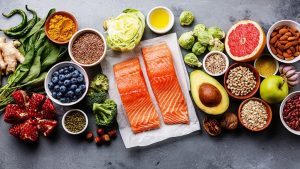| What doesn’t make sense is blindly counting them, because it makes a difference whether you’re eating 100 calories of celery versus 100 calories of sugar. People say all calories are equal.
But they are not, Nutritional benefits aside…
Because we process different foods very differently. The number on the packet does not equal the number of calories you end up using. What’s not reflected is the amount of energy it takes you to “get at” the calories. Something like fat doesn’t cost a lot to break down. It’s 97% calorically available. Carbohydrates? It depends whether we’re talking about wholemeal bread or sugar. Wholemeal bread is 92-95% available, sugar is 95-97%. The big difference lies in protein. For every 100 calories of protein we only absorb 70 calories.
How much of a difference does that make?
It doesn’t make a big difference from meal to meal. But over every single meal of your life, it will. If you look at foods which aren’t high in quality, particularly ultra-processed foods, they tend to be low in protein and fibre, both of which are less calorically available. The amount of protein and fibre in foods is an easy marker of quality. It’ll make you feel fuller, too. If you are able to harness your biology to make yourself feel naturally fuller, then at least you have a fighting chance.
In one study, published in Food & Nutrition Research, two groups were given sandwiches with identical calorie counts: one made with whole foods, the other heavily processed. The former required 47% more energy to digest.
Concern yourself with the quality of the food you’re eating. We should be better at this – as policy makers, as scientists and as people trying to make food choices.
Looking for ways to improve the quality of your diet will improve your health, and if you focus on your health, your weight will sort of take care of itself.
Focusing on the quality of your food – limiting sugar and processed foods, and eating more whole foods – has been shown to lead to greater weight loss than focusing on calories and portion sizes, reports a Stanford University study.

A lot of calorie-counters whose primary goal is weight loss would find that contentious…
But start by asking why you’re trying to lose weight. And be honest. There’s going to be a reason. If you want to lose weight to look good, You might not be totally happy with how you look, but are you healthy? Are you able to lift your child up? Are you able to go out and cycle? Are you eating high-quality food? If the answer is yes and you can maintain your weight, then perhaps that’s what you should do. There’s an element of getting people to be realistic.
What about the concept of a “set point” weight?
I usually refer to a set range. Say I lose half a stone. Keeping that off will require effort. But if I stay where I am, there’s almost no effort. My current habits – I exercise, I do my commute, I eat what I want on weekends – mean I’m not gaining weight. Your set range is where you’re stable.
If you’re an MMA fighter or a model, that’s a different thing. But those careers are short. For most of us, what we want is to be able to walk up the stairs or go for a run without feeling out of breath. Look, at lot of people do need to lose weight, I’m not saying they don’t. But a lot of people just need to be healthier.
Obesity is a problem. But then there’s blaming people who are suffering from that problem – people conflate the two. Undoubtedly, the prevailing view is that our bodyweight is a choice. We only know ourselves. If I stop eating a pizza after two slices because I’m no longer hungry, I might look at a person who had four slices and think, “Why did he need four?” But it’s the equivalent of someone stopping me at one slice and telling me I can’t have a second. Our thermostats are set in different places, biologically. Some people think they have more willpower, but we are just looking at ourselves and projecting onto other people.
According to research, some people are genetically 5% less likely to be able to say “no” to excess food, which makes choosing satiating foods – those high in fibre and protein – even more crucial.
Healthy eating guidelines are very simple:
- Base each meal on good quality protein (Unprocessed meat / fish / fowl, eggs, nuts)
- Eat 3 – 4 servings per day of veg (include some greens and coloured veg)
- 1 or 2 pieces of fruit per day max
- Keep sugar to a minimum
- Use healthy fats (nuts / fish / coconut oil or cold pressed olive oil)
- Be aware of salt content of foods: don’t add salt
- Watch hydration levels
- Have breakfast
- Keep alcohol to a minimum
- When eating out, have unprocessed meat / fish / fowl & any veg. Avoid carbs (rice, potatoes, pasta, chips) and go easy on the sauces & skip dessert
Bonus: one cheat meal per week where you break all the rules is ok!
Remember, it’s not a diet – it’s just sensible, healthy eating!
|
